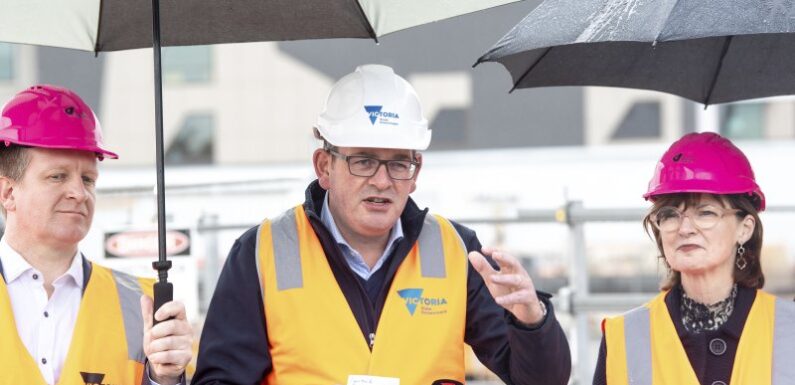
Save articles for later
Add articles to your saved list and come back to them any time.
Planning decisions would be fast-tracked under a major package to ease Victoria’s housing crisis, which Premier Daniel Andrews said would represent one of the state’s biggest policy shake-ups, but the opposition has accused the government of distraction tactics after cancelling the Commonwealth Games.
Andrews said everything was on the table when asked on Sunday about reports the government was considering new rent controls and a tax on short-term stays, such as Airbnb accommodation.
Victorian Premier Daniel Andrews and Health Minister Mary-Anne Thomas at a press conference on Sunday.Credit: Penny Stephens
The proposal to limit the amount and frequency of rent increases was slammed by the Real Estate Institute of Victoria and the opposition – which said the measures would dampen housing supply – but welcomed by the Greens and Tenants Victoria.
In April, The Age revealed local councils could be cut from decision-making on major development projects under a massive planning overhaul expected to be delivered within weeks.
This followed frustration with planning delays at the local level and the reluctance of councillors to support higher-density projects because of the fear of backlash from residents.
“When I talk to industry, the biggest thing that will make a difference to them is getting our planning approvals done … so good decisions made faster,” Andrews said on Sunday.
“The biggest thing we can do to give certainty to business is to make sure they get their planning approvals as fast as possible.”
He said this applied not just to the state government but also to councils and all the planning frameworks in place.
“There are some really significant improvements and reforms to be made there, together with some innovative models, and the government obviously reserves the right to make a range of other decisions.”
The government’s long-awaited housing affordability package will contain planning reforms to stop urban sprawl and increase housing density in middle suburbs and give renters greater protections.
The Sunday Age revealed on the weekend that the government was considering rental caps and limiting landlords to one rent hike every two years, up from the current 12-month limit for most cases.
Earlier this year, it was reported the government was examining a “tourist tax” on short-term rentals, such as Airbnbs, as has been done overseas, to ease the rental crisis.
Various rental cap models are being looked at, including the system operating in the ACT, where a landlord cannot increase rent by more than 10 per cent above the Consumer Price Index (CPI) without regulatory approval.
Real Estate Institute of Victoria CEO Quentin Kilian said rental caps would have a disastrous long-term effect because it would lead to a loss of rental properties.
“They are not going to resolve the underlying issue, which is supply, in actual fact it is just going to exacerbate the departure from the rental market of rental providers,” Kilian said.
“We’ve already heard from our members that many of the rental providers that are putting their properties up for appraisal or for sale, have just had too much pressure now with land tax increases and rate increases that they’re just getting out. This will just exacerbate that issue, which actually then creates a bigger problem of further homelessness.”
But Tenants Victoria CEO Jennifer Beveridge said she was very supportive of capping rent increases and limiting the number of rent increases that can be made.
“We’ve had renters come to us in distress because their rent has been increased by 20, 30, 50, even 100 per cent in some cases, and that is just too much for people to be able to manage, particularly those who are struggling with the cost of living increases anyway,” she said.
Victorian Council of Social Service CEO Emma King backed a similar rent cap model to the one in the ACT, where the onus was on the landlord to get approval to increase the rent by more than 10 per cent above CPI.
“We need a formula for fair rent increases,” she said.
Michael Fotheringham, managing director at the Australian Housing and Urban Research Institute, said rent controls should be paired with an injection of new housing.
He said it was also important to ensure the quality of properties did not deteriorate, which had happened in some countries that introduced rent caps or freezes.
“Landlords cease doing any maintenance because they say, ‘Oh, well, I’m not getting a yield on this, I’m not going to put any money in it’ so repairs don’t get done,” Fotheringham said.
“So you need to have good protection for renters around quality and timeliness of repairs.”
Opposition Leader John Pesutto accused the government of coming up with policy ideas on the fly to distract the public after it cancelled the Commonwealth Games last week.
“Everybody I talked to, from renters to investors, all seem to agree that rent caps and other restrictions will discourage investment and housing supply,” he said.
“For renters, it will mean, ultimately … the rents will actually go up because there’ll be less supply of housing.”
The Greens’ renters’ rights spokesperson, Gabrielle de Vietri, said she was pleased the government was considering much-needed rent controls.
“Along with a potential cap on rent increases, we also need to see an immediate rent freeze, short-stay regulations, and a stronger vacancy tax,” she said.
The Morning Edition newsletter is our guide to the day’s most important and interesting stories, analysis and insights. Sign up here.
